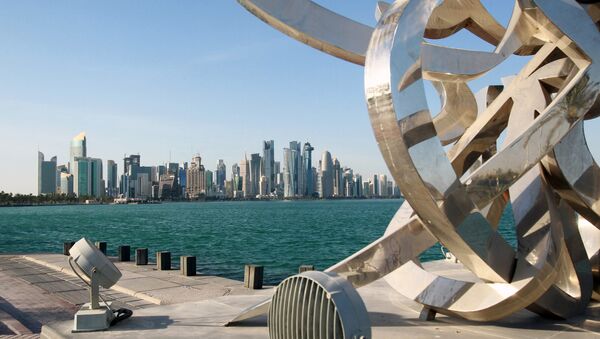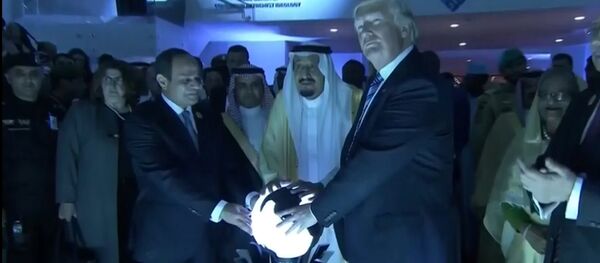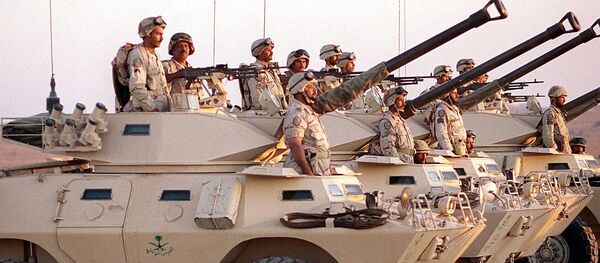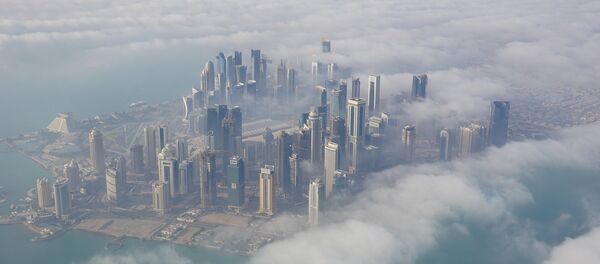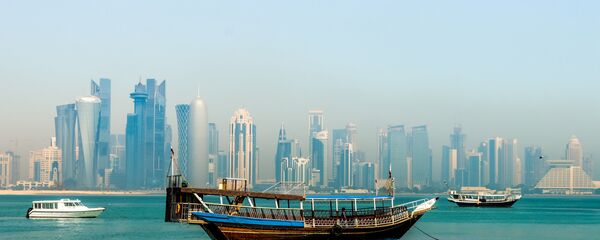Libya made a similar decision. Yemen cut diplomatic relations citing Doha's links with Houthis. The Maldives took the same step, citing extremism and terrorism concerns. Mauritius joined the boycott. Mauritania broke off diplomatic ties with Qatar while Jordan downgraded ties with the country on June 6.
The Qatari Foreign Ministry rejected the accusations of Doha's interference in other countries' domestic affairs and expressed regret over the decision of the Gulf States to cut off diplomatic ties with it.
What's Behind Saudi-Qatar Row
Doha quickly responded, saying that the website was hacked, which was later confirmed by FBI specialists.
Gevorg Mirzayan, Associate Professor at the Department of Political Sciences of Finance University under the Russian Government, suggested that the incident was only a pretext for Saudi Arabia and there are some real and important reasons for such a "punishment."
First, Riyadh claims that Doha breaks the rules in the struggle for political influence in the Arab world. While Saudi Arabia has long betted on financing political elites in other countries, Qatar’s main weapon is soft power, including Al-Jazeera broadcaster. According to Mirzayan, soft power has repeatedly proved more effective than Riyadh’s policy of political and ideological support.
Russian expert in Arab studies Igor Alexeyev noted that the ideology of the Muslim Brotherhood is based on kind of a doctrine of dogmatic and legal centrism. According to it, Ummah is not a community of true believers, but rather a historical entity uniting all Muslims despite their views and beliefs.
"Such a doctrine contradicts the radical concept of Wahhabism, which forms the core of Riyadh’s domestic and foreign policy," Mirzayan wrote in an op-ed for Sputnik.
The final reason, according to the expert, is the fact that Qatar has the friendliest ties among the members of the Gulf Cooperation Council (GCC). Doha has long called to ease tensions between the Gulf and Tehran. While previously Riyadh had to get along with the fact, but the recent developments in Syria, Iraq and Yemen have changed the situation. Currently, Saudi Arabia is implementing an anti-Iranian policy, including using the support from Washington.
"The isolation of Qatar was widely being taken as a clear message from Saudi Arabia that in the new order, no softness on Iran or on the Muslim Brotherhood would be tolerated," an article in The New York Times read.
Saudi Pressure on Qatar
According to the expert, the current tensions between Qatar and Saudi Arabia are strategic, and the sides need a compromise on the issue.
"Apparently, Riyadh believes that it can easily impose its will on Doha. This is why Saudi Arabia was quick to impose the most possible restrictions," Mirzayan wrote.
"Qatar receives 99 percent of its food from outside. They are wholly dependent on outside supplies, particularly with foodstuffs. The land border accounts for about 99 percent of that 99 percent that comes in," Theodore Karasik, a senior adviser with Washington-based Gulf State Analytics, told The Washington Post.
Moreover, potential logistics disruptions may damage Qatar’s reputation as the host of the 2022 FIFA World Cup.
The blockade also challenges Qatar’s status as a reliable regional partner of the United States. Al Udeid Air Base, the largest American base in the region, is located in Qatar. Washington said that in the short-run the Riyadh-Doha row would not affect counter-terrorism cooperation.
The disruption of counter-terrorism cooperation remains possible though.
"How, for example, can the American-led air campaign include warplanes from Bahrain, Saudi Arabia and the United Arab Emirates if those governments will no longer allow their military representatives to be based at, or even to visit, a major United States command center?" The New York Times wrote.
"Saud Arabia believes that Qatar will take into account all of those risks and will keep in mind that much weaker pressure on Doha resulted in a regime change in 2013. This is why Saudi Arabia believes that Qatar will take into account the requirement from its big brother," Mirzayan pointed out.
Two Scenarios
On the one hand, the country’s Foreign Ministry said that Doha is not considering responsive measures and wants constructive dialogue.
"Qatar believes that such differences between kindred nations should be resolved through dialogue," Foreign Minister Mohammed bin Abdulrahman Al Thani said.
On the other side, Qatar delivered some response though. In particular, Al Jazeera made a report based on leaked emails of UAE Ambassador to the US Yousef al-Otaiba. The documents revealed that the he had talks with pro-Israeli think-tanks, criticizing Riyadh’s domestic policy. According to Al-Jazeera, the UAE plans to replace Saudi Arabia as Washington’s right hand in the region.
Mirzayan suggested that the move was not an act of revenge or punishment. In fact, Doha proved that it has the capability to launch a media campaign against any of its neighbors and could do that until a compromise is reached.
Mirzayan suggested that among the possible new partners there could be Iran, Turkey and even Russia.
"Russia’s political role in the Middle East has recently increased. The Kremlin can be regarded as a guarantor of security and political partner. In turn, increased political presence in the Gulf would serve Moscow’s interests. There a lot of differences between Moscow and Doha, but the current political situation requires cooperation," the author concluded.

